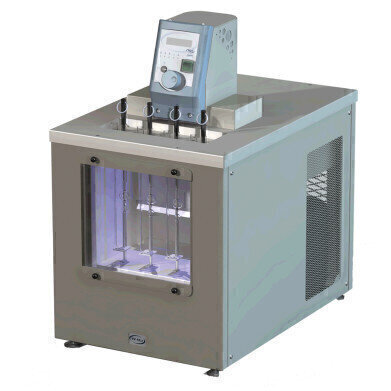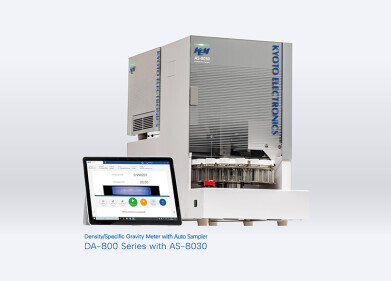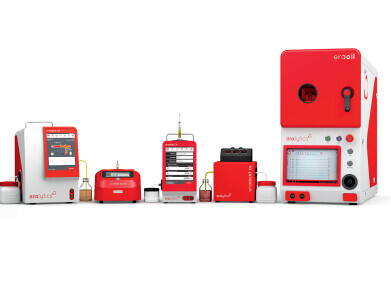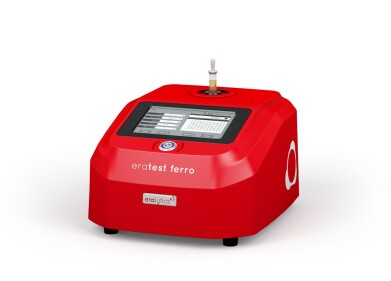Analytical Instrumentation
New Instrument Meets and Exceeds the New Requirements for Kinematic Viscosity of Aviation Turbine Fuels at -40°C!
Dec 21 2015
At every stage, between refining and the aircraft fuel tank, jet fuel quality is tested. These checks ensure that the fuel conforms to requirements specified for the grade when it is delivered to the aircraft. While several parameters of jet fuel are measured to define its properties, its low temperature kinematic viscosity is determined mainly for safety.
The operation of jet aircraft at high altitudes over long periods of time dictates good low-temperature flow behavior of jet fuel. If the fuel’s viscosity is too high during fuel injection, the pilot may not be able to quickly restart the engine during flight. A second problem relates to lubrication at low temperatures. If the viscosity is too low, a lack of lubrication can lead to mechanical failure of the fuel pump and could potentially cause engine failure. Low temperature kinematic viscosity of jet fuel is normally done at -20°C. More and more commercial airlines are reporting that they can’t quickly restart the engine while on a long-haul flight. Testing at -40°C is becoming increasingly important to OEMs and there is a movement to make -40C a specification requirement within ASTM D1655 and Defence Standard 91-91. Until now, it was assumed that the kinematic viscosity of jet fuel did not exceed 12 mm²/s @ -40°C when the measured kinematic viscosity @ -20°C was below 8 mm²/s.
Because of the change in rate per unit temperature is significantly higher for viscosity than for other properties, temperature control is the single most important parameter for obtaining accurate and precise kinematic viscosity measurements. The Tamson TV12LT, introduced in 2009, is the only available manual instrument which has a temperature range down to -48°C. Temperature stability of the TV12LT is very precise (± 0.014°C) over the entire range. The TV12LT is much more stable than the requirements in ASTM D445 where a bath temperature stability of ± 0.05°C below 15°C is allowed. Extensive testing showed that errors in temperature drift and in homogeneity combined with poor bath stability (>0.02°C) could easily produce measurement errors over 1%! That is why homogeneity, ultra-low temperature drift, and high temperature stability are imperative to meet critical specifications to prevent engine failures.
Tamson recently participated in the joint ASTM/Energy Institute (EI) inter-laboratory study (ILS). EI developed a new method, IP PM EJ/12 for determining the kinematic viscosity of aviation turbine fuel using both a specified manual method (A) and an automated method (B). For method A, 15 laboratories participated at -20°C and seven labs participated at -40°C. Most laboratories used the Tamson TV12LT. In December 2015, the manual data will be officially published. As it turns out, the precision is better than the precision of an ILS performed in 1997! Based on other studies (e.g. “Grand Design” of ASTM D445) these improvements were not expected and Tamson assumes that in this ILS the very stable TV12LTs contributed to the increase in precision (r + R).
There was not enough data produced due to the lack of participants for the automatic instruments (Method B) both at -20°C and -40°C. Therefore, the results could not be published and a new ILS is scheduled in the coming years. That means that only the latest precision data are available for labs performing the manual measurements (Method A) at -20°C and the new required measurement at -40°C where the TV12LT played an important role in the ILS.
For more information about the TV12LT, please contact DC Scientific at 410-863-1700 or visit us on line at www.dcscientific.com.
Digital Edition
PIN 25.2 Apr/May
May 2024
Safety - Carbon monoxide toxic and flammable gas detection Analytical Instrumentation - Density: A fundamental parameter at critical stages within the petroleum sector - Advancements and...
View all digital editions
Events
May 14 2024 Tashkent, Uzbekistan
May 14 2024 Oklahoma City, OK, USA
May 15 2024 Lund, Sweden
May 15 2024 Copenhagen, Denmark
May 15 2024 Frankurt-am-Main, Germany


















